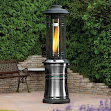Air conditioning – a condensed history
The first air conditioning
systems were in use as early as 1902, but they were not for the comfort of
people!
According to Tim Hartford of the BBC World Service[1], Sackett & Wilhelms Lithographing and Printing Company in New York found that varying humidity levels affected the quality of their printing. The paper had to be printed up to four times in four colours and changing humidity made the paper expand or contract slightly, misaligning the print.
According to Tim Hartford of the BBC World Service[1], Sackett & Wilhelms Lithographing and Printing Company in New York found that varying humidity levels affected the quality of their printing. The paper had to be printed up to four times in four colours and changing humidity made the paper expand or contract slightly, misaligning the print.
The company approached a heating company, Buffalo Forge, to
devise a system to control the humidity.
Engineer Wills Carrier invented the first modern type of air
conditioning in which air circulated over coils chilled by compressed ammonia which
kept the humidity at a constant 55%.
Carrier’s invention soon proved popular in industries where
excessive humidity was a problem – such as flour mills and the Gillette
Corporation, where excessive moisture would cause the razor blades to rust.
The benefits for workers in these industries were
incidental, but Carrier started to explore other applications such as cooling
public spaces. This new invention was
particularly popular in theatres, which used to shut down during the
summer. London Cool still hires portable
cooling to many theatres, particularly the older London theatres where fixed
air conditioning is not an option.
Air conditioning is now considered more than a convenience;
it is a ‘transformative technology’.
For example, air conditioning is vital in data
centres or server rooms as business-critical computers can fail if they get
too hot or too damp. It has allowed the
development of high-rise glass fronted skyscrapers and shopping malls in our cities.
Many factories need to control their air quality where dust or humidity
would affect the quality of the finished product. London Cool has many food
manufacturers among its customers.
Air conditioning also has an effect on productivity and
well-being -
·
When the temperature exceeds 21C or 22C in exam halls,
students start to score lower in maths tests.
·
In offices,
air conditioning makes us more productive: according to one early study, it
made US government typists do 24% more work. According to Geoffrey Heal and Jisung
Park human productivity peaks at between 18C and 22C.
·
Studies show that it lowers mortality during
heat waves.
Air conditioning technology is getting cleaner and greener
with F
Gas R22 and HFCs with high global warming potential, being phased down. London Cool is F-Gas certificated with Refcom, demonstrating that our engineers are fully trained in the correct procedures for handling refrigerants.

Comments
Post a Comment
We would love to hear your comments or views on portable air conditioners or fixed air conditioning systems or anything else in our Cool Blog